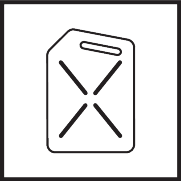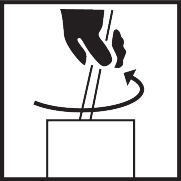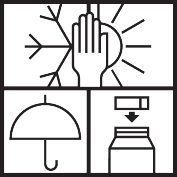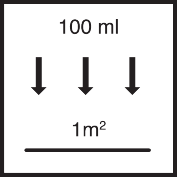Article No. 226105
Solvent-based premium wood preservative stain with excellent moisture protection for exterior wood
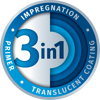
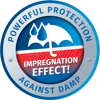
Product specifications
On delivery
The stated values represent typical product characteristics and are not to be construed as binding product specifications.
Field of application
- For use on exterior wood
- Wood without ground contact
- Wood building elements with no dimensional stability: e.g. fences, framework, carports, planking
- Wood building elements with limited dimensional stability, e.g. folding shutters, matchboarding, summerhouses
- Dimensionally stable wood building elements (when used as a primer only): e.g. windows and doors
- Primer, intermediate and finishing coats
Properties
- 3 in 1: impregnation, primer and stain
- Protects wood from moisture and UV radiation
- Impregnation effect: saturates wood to protect against moisture
- Diffusion-open protective film: moisture can escape
- Water-repellent: wet surfaces dry quickly
- Protection against weathering (constructive protection and the protection provided by the product) reduces the risk of blue stain and rot
- Increased solids content provides physical protection against nesting wasps
- Film protects coating against blue stain, mould and algae
- Subsequent treatment without sanding
-
Preparation
-
Substrate requirements
The substrate must be clean, dry, free of dust, grease and loose substances, and prepared in the correct manner.
Dimensionally stable wood building elements: wood moisture content 11-15%
Wood building elements with limited or no dimensional stability: wood moisture content max. 18%
-
Preparations
Completely remove old coatings (e.g. paints or medium-build stains), bark, bast and dirt.
Remove loose and torn knots as well as resin that bleeds and clean with a suitable product (e.g. Remmers thinner & brush cleaner).
Smooth, planed wood surfaces should be sanded and dusted before the coating is applied to ensure better absorption.
Observe BFS Code of Practice No. 18 "Coatings on Wood and Wooden Working Materials in Outdoor Areas".
-
-
Application
-
Stir well.
Private users: Application by brush.
Professional operations: Application by brush, dipping, flow coating; spraying only in closed facilities.Apply in the direction of the grain.
Apply a second coat once the first has dried.
When coating continuous surfaces, only use materials with the same batch number as slight differences in colour, gloss and texture may occur.
Seal opened containers well and use contents as soon as possible.
-
Application instructions
-
Check colour, adhesion and compatibility with the substrate by setting up a trial area.
Before coating technically modified woods and wood-based materials, apply the product to a trial surface and conduct a suitability test on the desired area of use.
If the surface is overcoated with other products it is recommended to test the adhesion to the substrate.
Clear, white and hemlock are suitable for use only on not directly weathered surfaces in outdoor areas, such as roof eaves, or as base coat.
Due to the different covering properties of white and pastel varnish colours, the optical appearance may vary depending on the substrate. It must be checked in advance whether discolouration of the varnish may occur due to substances contained in the wood.
Due to the low UV protection of these colour shades, shorter maintenance intervals must be expected.
In order to take account of and clarify these issues, a trial surface must be prepared in order to ensure that the surface meets expectations.
Rainfall may cause water soluble substances to bleed from wood that is rich in such substances, e.g. oak, red cedar, afzelia, redwood, etc. This may lead to the discolouration of light-coloured masonry or render.
Pre-testing is recommended also on other woods.
In order to avoid the use of wood preservatives as far as possible, the construction should be designed to be water-repellent ( avoid horizontal surfaces, open end-grain wood, capillary joints, water and moisture pockets, splash water contact, sharp edges). If this cannot be guaranteed or if an even higher level of protection is required outdoors, the untreated wood can be impregnated with Wood Preservative Primer* (*Use biocides safely. Always read the label and product information before use).
Cut end-grain surfaces at the bottom to create a water-drip edge.
Each layer of stain results in a more intense colour and a glossier finish.
-
Drying
Approx. 12 hours at 20 °C and 65% relative humidity.
Low temperatures, poor ventilation and high humidity delay drying.
Even once the coating is sufficiently dry for handling, less volatile solvents may cause surface to feel clammy to the touch over several days!
This property does not constitute a flaw!
The evaporation of these solvents can be accelerated by the ensuring the highest possible air exchange.
-
Thinning
Ready to use
-
Working tools / cleaning
-
Brush with natural bristles, flat brush
-
Clean tools immediately after use with thinner and brush cleaner.
Ensure that any residue from cleaning is disposed of correctly.
-
Storage / shelf life
-
At least 36 months in unopened, original containers stored cool, dry and protected from frost.
-
Usage
-
Approx. 100 ml/m² per coat, at least 2 coats required
-
Planed or very thick woods are less absorbent and may require a third coat
-
General information
-
On planed larch and softwoods with a high resin content, the coating may have reduced adhesion and resistance to weathering. This is especially the case on horizontal year rings, knots and areas of winter growth that are high in resin. Maintenance must be carried out more frequently on these surfaces.
The only remedy for this is pre-weathering or very coarse sanding (P80).
If these wood types are rough-sawn, considerably longer maintenance intervals are to be expected.Observe the regulations concerning design principles for wood protection.
Do not use on horizontal surfaces without drainage slopes and without edge radius, avoid accumulated moisture.
-
-
Disposal instructions
-
Larger quantities of leftover product should be disposed of in the original containers in accordance with the applicable regulations. Completely empty, clean containers should be recycled. Do not dispose of together with household waste. Do not allow to enter the sewage system. Do not empty into drains.
-
-
Safety / regulations
-
For further information on the safety aspects of transporting, storing and handling the product and on disposal and environmental matters, please see the current Safety Data Sheet.
-






